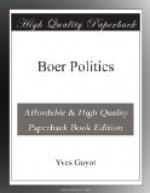Physical and biological science owe to the objective method the progress that, from the times of Bacon and Galileo, has transformed the face of the world; social science must henceforth replace rhetoric, scholasticism and all balderdash of that kind; affirmations, a priori, and excommunications, by the rigorous scrutiny of facts: Unity of Method will lead to Moral Unity.[25]
[Footnote 25: Yves Guyot. Les Principes de 1789 et le Socialisme.]
APPENDIX A.
I cannot do better than reproduce at the end of this pamphlet the analysis made by me in Le Siecle, March 14th, of a remarkable article written by M. Tallichet, Editor of the Bibliotheque Universelle de Lausanne.
ENGLAND, HOLLAND AND GERMANY.[26]
I have good reason for believing that President Krueger was kept by Dr. Leyds under the illusion that he could count on intervention in his favour. However, “Who should intervene?” is the question asked by M. Tallichet in his article, La Guerre du Transvaal et l’Europe, published by La Bibliotheque Universelle de Lausanne.
“President MacKinley, as was asked of him in a petition organised by the Peace League? He has no such intention. Of the European Powers, three only could have tried to do so: Russia, Germany and France. Russia, however, who might have induced France to act with her, will not trouble herself about it. Nicholas II., her sovereign, has but lately taken part at the Hague in a conference promoted by himself for the purpose of considering the means of insuring peace. Having taken the initiative he may be believed to have been actuated by philanthropic motives. But it also happens that peace is, for Russia, of the greatest importance, grown, as she is, out of all proportion, continuing to extend her tentacles wherever there is a chance of seizing something. To this cause of weakness must be added others: the need of money for her gigantic enterprises; the famine, now become endemic, by which her European provinces are ravaged, depopulated and reduced to the greatest misery. She is profiting now by her experiences after the Crimean War. As long as she remains inactive, the influence she exercises on general politics by her mere extent, and the mysterious power which seems to be the corollary of it, far exceeds her actual strength. On her descending into the arena, however, this optical illusion is dissipated, as was apparent in the recent Turkish War; her prestige was lessened. No steps will therefore be taken by her to increase England’s difficulties by which she gains much without striking a single blow.
“With regard to France, her only interest in the question is her rivalry with England and the possibility, afforded by the latter’s difficulties, of re-opening the Egyptian Question. Public opinion was sounded on this subject by




